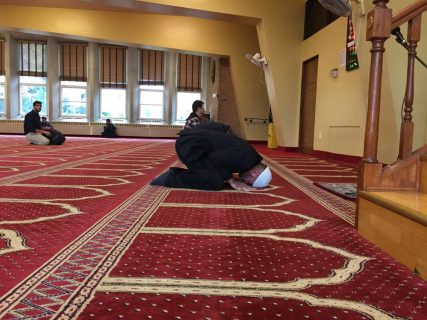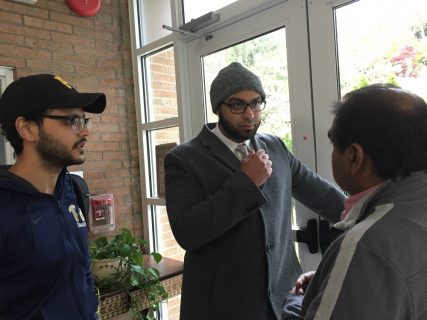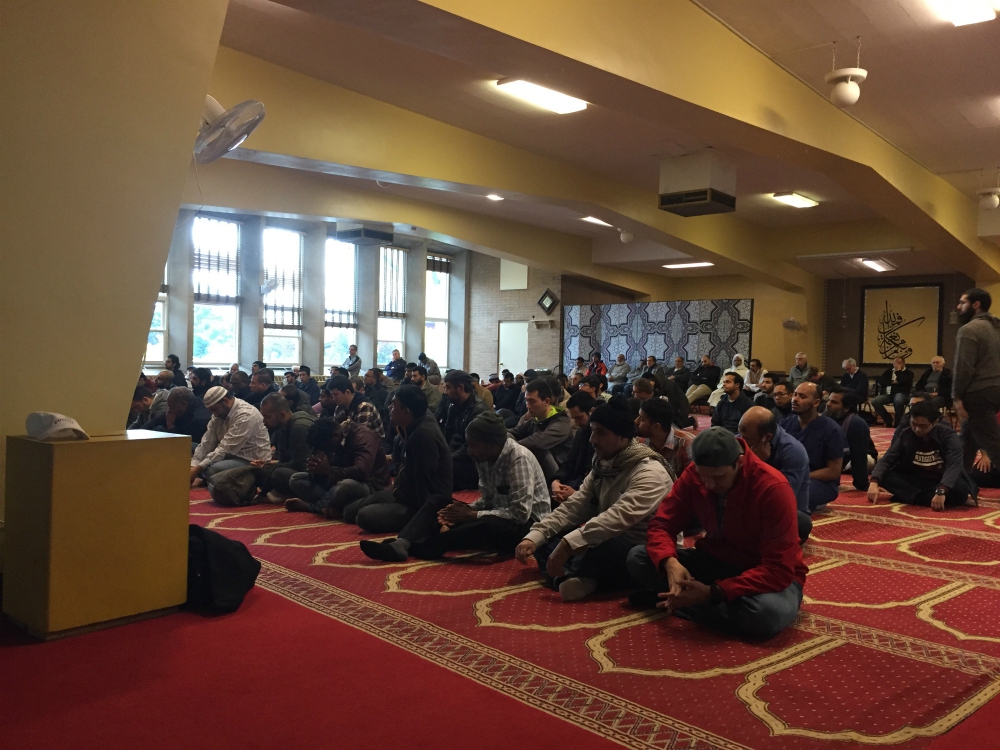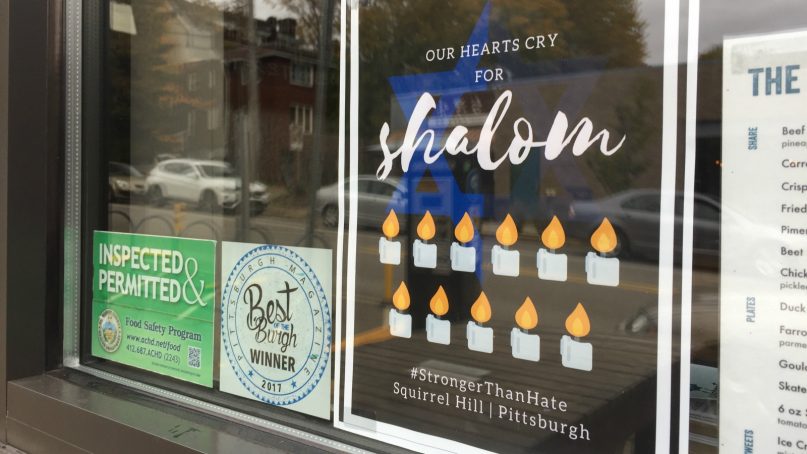PITTSBURGH (RNS) — At the end of Jummah prayers at the Islamic Center of Pittsburgh on Friday (Nov. 2), its leaders made an unusual request: Go attend Friday night services at a synagogue near you.
The request came an hour before the funeral of 97-year-old Rose Mallinger, the last of those killed at Tree of Life synagogue to be buried, and as the Jewish community of Squirrel Hill was readying for its first Shabbat after 11 of the synagogue’s congregants died in an anti-Semitic shooting spree last Saturday (Oct. 27).

A man prays on Nov. 2, 2018, at the Islamic Center of Pittsburgh. RNS photo by Yonat Shimron
Politically, American Jews and Muslims have their differences, especially on the issue of Palestinian statehood, but here in Pittsburgh, the two faith groups have cultivated a strong and mutually supportive relationship, one that precedes the terrorist strikes of 9/11.
These days, they also share a common foe: people who demonize immigrants, such as Robert Bowers, the man accused of storming the synagogue with a semi-automatic weapon and shooting indiscriminately.
Bowers was particularly incensed by the Hebrew Immigrant Aid Society, reportedly posting on social media, “HIAS likes to bring invaders in that kill our people.” He was apparently referring to Muslims. HIAS has taken pride in resettling mostly Muslim refugees from war-torn Syria.
Muslims, like many Jews, understand that a person like Bowers could strike at their faith community, too.
“You go half an hour this way or that way, it’s a different country,” said Mizanoor Biswas, chair of the board of directors of the Islamic Center of Pittsburgh. “Immigrant sentiment is very raw. I don’t want to talk politics, but the seed is there. It’s spewing all over.”
For Jews, who are themselves mostly children or grandchildren of immigrants, growing nativism is a serious concern.
“The Jewish story in America is one of the most successful stories of immigration, ever,” said Rabbi Jamie Gibson of Temple Sinai, a large Reform congregation in Squirrel Hill. “People came to this country and often lived in poverty in the first generation but worked very hard to achieve what used to be called the American dream. We do not want that dream all to ourselves.”
Many here in Pittsburgh have noted that the same raw immigrant sentiment was apparently shared by Cesar Sayoc, the Florida man accused of mailing a pipe bomb to George Soros, a Jewish hedge-fund manager turned global philanthropist who was born in Hungary. President Trump’s calling Hispanic immigrants “rapists” and “animals” hits hard in Jewish communities like Squirrel Hill, where the elders especially remember how Jews were taunted in Nazi Germany.

Imam Amro Elagwalli confers with board member Muhammed Haq, left, and Mizanoor Biswas, right, on Nov. 2, 2018, at the entrance to the Islamic Center of Pittsburgh. The three urged Muslims to attend Friday night services at synagogues across the city to show solidarity with Jews. RNS photo by Yonat Shimron
Meanwhile, this week’s funerals have been held as thousands of active-duty soldiers are being sent to the U.S. border with Mexico to bar the efforts of a Central American migrant caravan to seek asylum in the United States.
“There’s this sadness and anger toward the president who keeps pouring oil on the fire,” said Jacob Naveh, an educator who has lived in Squirrel Hill since 1969.
Bowers himself is alleged to have been motivated in part by anti-Semitic agitators who contend that Jews — or at least some prominent Jews like Soros — are behind an effort to replace native-born whites with immigrants.
Muslims, no less attuned to the anti-immigrant rhetoric, are taking note of the rising hysteria and working hard to combat it. They were among the groups to raise the most money for victims of the Pittsburgh Jewish community. To date, the Muslims Unite for Pittsburgh Synagogue campaign has raised more than $232,000.
Wasi Mohamed, the Islamic Center of Pittsburgh executive director, went beyond a pitch for dollars.
“We just want to know what you need,” he told a crowd at a vigil honoring the lives of the shooting victims. “If it’s more money, let us know. If it’s people outside your next service protecting you, let us know — we’ll be there…. If you just need somebody to come to the grocery store because you don’t feel safe in this city, we’ll be there and I’m sure everybody in the room would say the same thing. We’re here for the community.”

Muslims pray Jummah prayers Nov. 2, 2018, at the Islamic Center of Pittsburgh. RNS photo by Yonat Shimron
Muhammed Haq, another Muslim center board member, said the beauty of America is that it brings different faith groups together.
“It’s interesting how many nationalities I’ve met here that I would never have met in any other nation on earth,” said Haq, who planned to attend a Friday night service at Rodeph Shalom, a Reform synagogue in Pittsburgh. “There are 48 nationalities in this mosque. I can’t travel to all those countries in my lifetime. But here in Allegheny County I can see the beautiful coming together of different cultures and religions.
“That’s what faith does,” Haq said. “Faith unites us; politics often divide us.”





